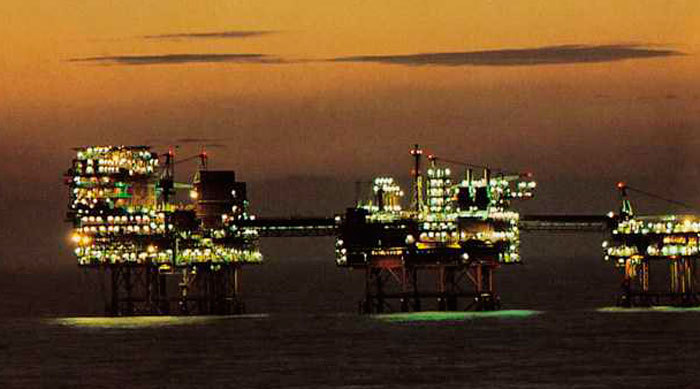
The prognosis for Centrica Plc’s business of storing natural gas is getting worse.
Its Rough facility, an old depleted gas field under the North Sea, will end up costing the company at least another 100 million pounds ($122 million), according to a Bloomberg survey of analysts and traders. That’s more than the capital expenditure for the past three years for the company’s storage unit.
While Rough was once a jewel in Centrica’s crown, its efficiency has declined with age and usage. The facility’s strategic importance to the U.K. gas market to has forced the company to throw cash at it to slow the decline, but over the last year, technical problems have mounted in frequency and severity.
The trouble at Rough has implications both for Centrica, which is losing money from a once-profitable business, and the U.K. economy, likely to experience more volatile energy prices without the level of flexibility the giant storage facility used to provide. Without some kind of financial support, the utility could decide further investment isn’t viable.
Centrica declined to comment on future spending on the nation’s largest gas store, but said because of its strategic value there may be scenarios where the U.K. will have to pay for the security it provides.
The nation’s energy security would be OK even if Rough closed, the U.K.’s Department for Business, Energy and Industrial Strategy said by email.
At its peak in 2007, Windsor, England-based Centrica’s storage arm made a 240 million-pound operating profit from storing the fuel for utilities, producers and traders. A 57 million-pound loss in 2016 will probably widen this year, Chief Executive Officer Iain Conn said last month.
“Something has to change, because the status quo isn’t viable,” said Dominic Nash, head of European utilities research at Macquarie Group Ltd. in London. “This company can’t afford to lose 50 million pounds from its operating profit every year.”
Part of the 2016 loss was because of a collapse in the spread between summer and winter prices, which the business is built on. Because of a glut, that differential is now about a third of what it was at a 2008 peak.
Price Volatility
Rough is the main facility in the U.K. where traders and utilities can inject fuel in summer and withdraw it months later during winter. When it shut for emergency repairs in September, price swings jumped to near a six-year high. Without Rough, such volatility could boost prices for consumers at times of peak demand, according to BMI Research in London.
Nine of 13 traders and analysts in the Bloomberg survey expect further repairs will cost more than 100 million pounds. The facility will shut completely within 10 years, eight of the respondents said, echoing comments from Chief Executive Officer Iain Conn last month, who doesn’t see the facility lasting beyond the 2020s. Three of the people surveyed think it will close within five years.
The U.K. has been a net importer of gas since 2004 because of declining North Sea output. Rough took on its current form in 1985 after then state-owned British Gas turned a depleted gas reservoir off England’s northeast coast into a storage site. Its main function was to keep prices from jumping during the winter if demand rose beyond what the fields could produce.
Wells degrade over time. Centrica said in September 2015 it was encountering problems due to the facility’s physical condition and requested more flexibility in how the site was run. The U.K. Competition and Markets Authority mandated Rough to stay open because it was deemed too important to the market.
Centrica took a 176 million-pound impairment for Rough in the first half of 2016. Four of the people surveyed believe the company will have to pay more than 200 million pounds before the facility shuts, both as part of repairs and decommissioning costs.
Emergency Repairs
The next big announcement from Centrica came in June last year as it was forced to halt Rough for emergency maintenance. When it resumes injections more than a year later it will only at most use 24 of the 30 wells it had at its peak, according to a Feb. 16 update.
“I can’t see Centrica investing enough to return Rough to its previous conditions prior to a more systemic increase in gas prices,” said Sam Berry, a gas trader at British Independent Utilities, which buys fuel for Tesco Plc and Royal Bank of Scotland Group Plc. “I suspect a nine-figure sum for repairs, at least.”
If the company decides to close it for financial reasons, U.K. regulators have less reason to intervene this time, according to Guillermo Baena Gomez, a senior market analyst and energy trader at Advantage Utilities Ltd. in London.
The expanding liquefied natural gas market, with supplies by tanker complementing pipelines from Norway and Belgium, mean that the U.K. will be able to balance supply and demand in similar ways to other nations depending on foreign supplies, like Japan, the world’s biggest LNG buyer. The U.K. only uses about a third of its LNG import capacity.
“In the next 10 years, the need for Rough could be minimal and Centrica could make the decision to close the facility on financial grounds,” Gomez said in an email. “And it will be allowed to do so, because the security of supply reliance on Rough will have disappeared.”
Recommended for you
